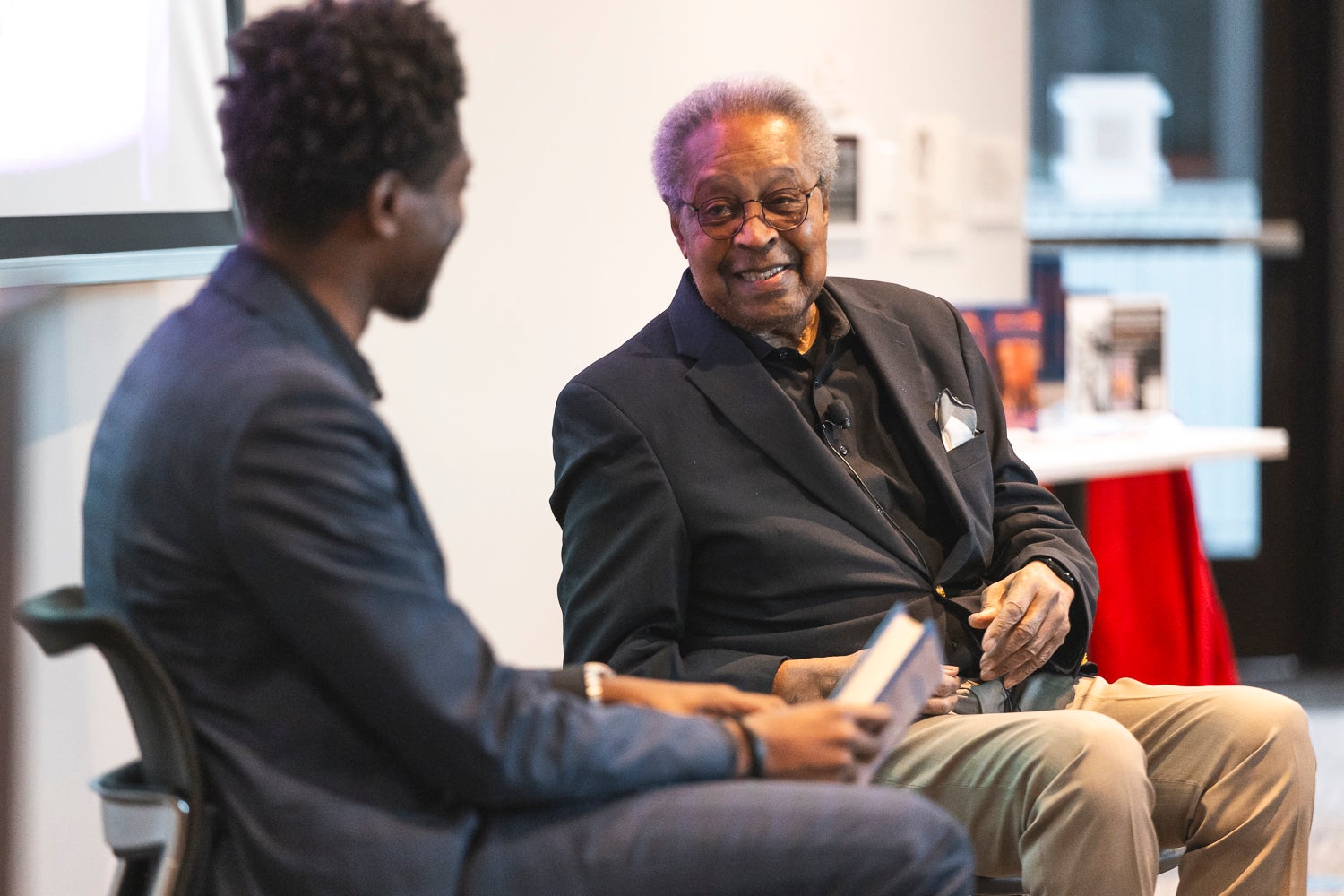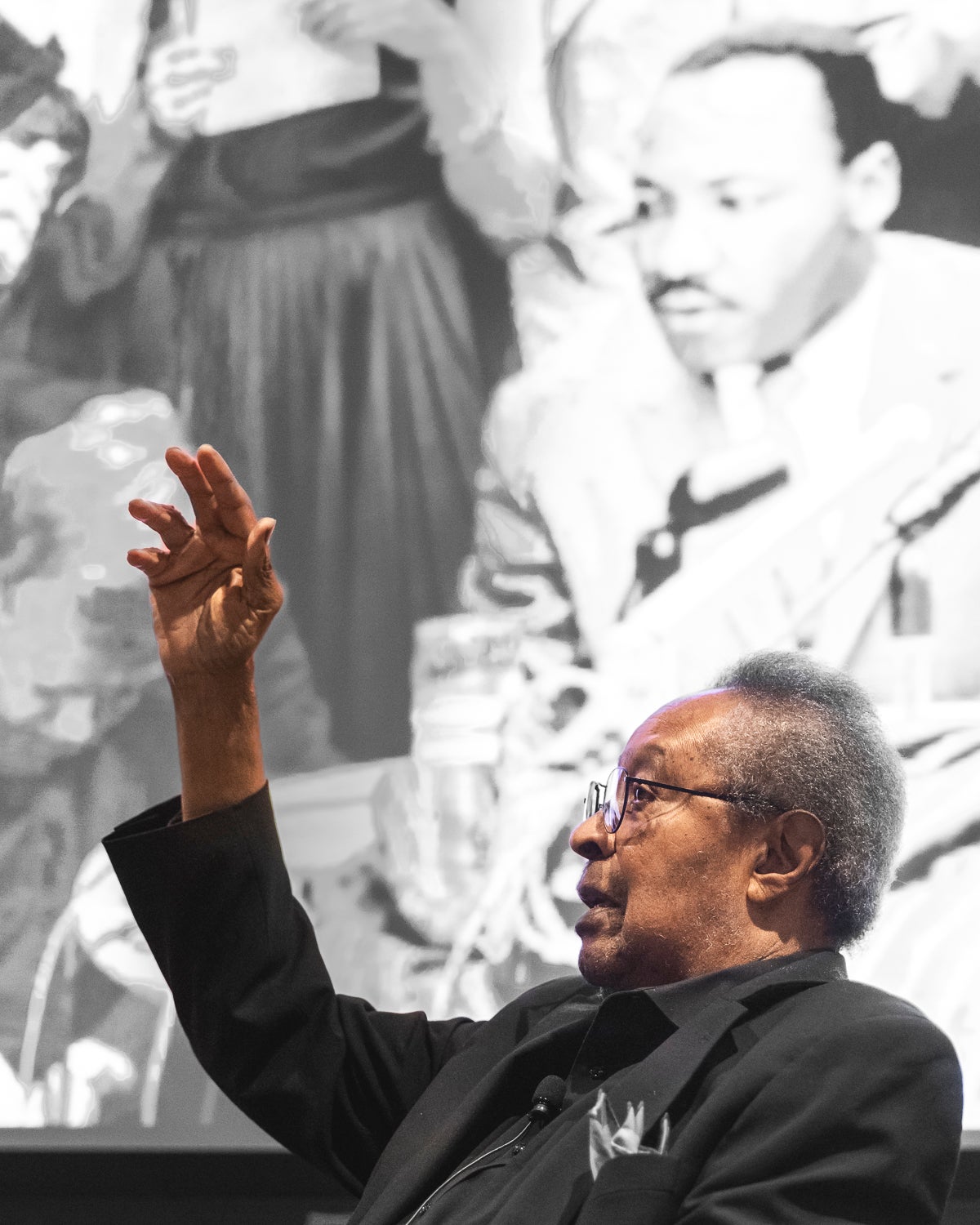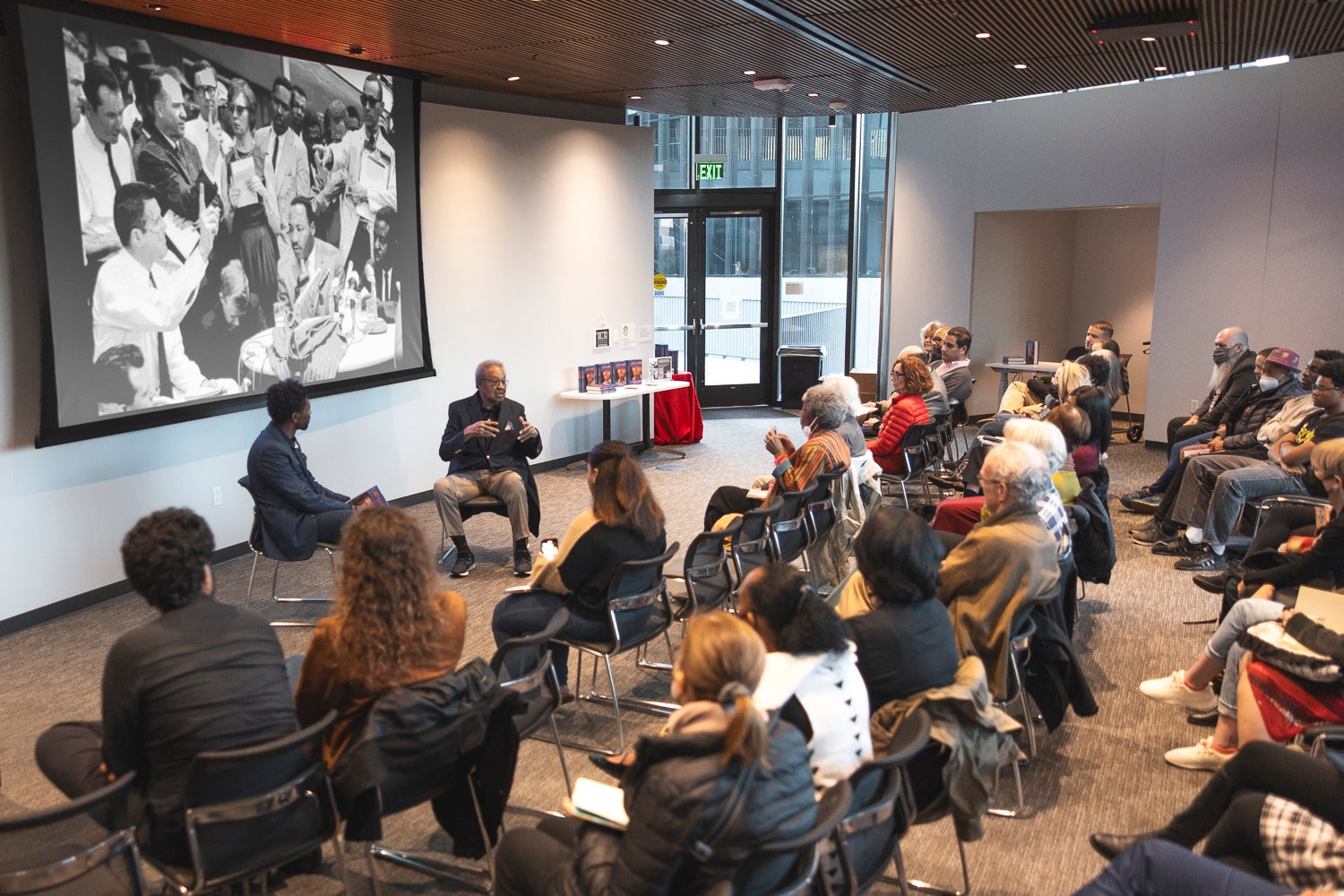
Lerone Martin, director of the Martin Luther King, Jr. Research and Education Institute, in conversation with King’s attorney and friend Clarence B. Jones. (Image credit: Andrew Brodhead)
A week before Martin Luther King Jr. would have turned 95, King’s personal attorney, advisor, draft speech writer, and friend Clarence B. Jones celebrated his own birthday.
On the evening Jones turned 93, he came to Stanford University for a special conversation with Lerone A. Martin, the Martin Luther King, Jr. Centennial Professor and director of the Martin Luther King, Jr. Research and Education Institute in the School of Humanities and Sciences.
At the event, titled “An Evening of Living History: A Conversation with Clarence B. Jones,” Jones shared some of the incredible experiences he has had over his lifetime, particularly working with King – from helping him draft speeches, including the “I Have a Dream” address at the March on Washington, to smuggling King’s “Letter from Birmingham Jail” out of King’s cell.
In one particularly poignant moment, Jones passionately addressed the audience – with tears in his eyes – and said: “If I’ve been blessed to have another 10 years, never ever, ever have I seen or will there be another Martin Luther King. Never, ever. The baddest dude on the Earth.”
Early life and ‘the making of a disciple’
Martin opened the conversion by asking Jones about his own life.
Jones talked about how he was an only child of two domestic servants. His mother was a maid and a cook with a seventh grade education; his father was a gardener and a chauffeur who couldn’t read or write.
From ages 6 to 14, Jones was sent to a Catholic boarding school. He transitioned to a public high school, where he became class president and valedictorian. He later went to Juilliard School of Music, Columbia University, and then Boston University School of Law.
After law school, Jones moved to California, where he worked in a private law firm. It was there he received a phone call from New York judge Hubert Delany asking if Jones could come to Alabama to help with King’s legal defense – he was being charged with tax evasion.

Jones told personal stories about working with Dr. Martin Luther King. (Image credit: Andrew Brodhead)
At first, Jones declined. He shared with the audience how he had gotten comfortable with the lavish lifestyle a career in private law provided him.
Jones then got another phone call – this time, it was to let him know that King and Bernard Lee were on their way to California to meet with him.
Over a fateful few days – which included a particularly stirring service King delivered at a local church that was directed to Jones and featured the Langston Hughes poem “Mother to Son” with words modified to reflect Jones’ own mother – Jones was convinced to take up King’s case and cause.
“When he did that, I started crying,” Jones recalled. “I said, ‘Dr. King, when do you want me to go?’ I call that ‘the making of a disciple.’”
Working for King
In addition to serving as King’s lawyer, Jones also helped him draft speeches.
Jones credited having a musical ear – a skill he developed at Juilliard – for helping him craft remarks in King’s voice.
“Just to set the record straight: Martin Luther King Jr. didn’t need Clarence Jones, Stanley Levison, or anybody else to write his speeches,” Jones said. “He was totally capable of doing it himself. The only problem is that he was on the road full time.”
Jones also played a pivotal role in helping King write the “Letter from Birmingham Jail.”
Over five to six days from his jail cell in Alabama, King composed his famous missive on sheets of paper that Jones would smuggle in tucked under his shirt. The guards paid little attention to Jones, who was dressed in a pinstripe suit and donned a fancy watch. Jones recalled how they would brush him off as “Dr. King’s New York lawyer.”
It was not until six weeks later when the letter was circulated that Jones realized what he helped carry out to the world. “Oh. My. God. I couldn’t believe it,” Jones said.
One of the things that impressed Jones the most was King’s ability to quote material he didn’t have access to in prison.
“He cooked things he didn’t have except in his head,” Jones said.
“Martin King gave a lot of speeches, but from my standpoint, if you had to bookend his life, it would be two documents,” Jones added. “One bookend would be the ‘Letter from Birmingham Jail’ and the other would be ‘Time to Break the Silence.’”
Other notable moments
Jones also talked about how the assassination of President John F. Kennedy had a chilling effect on King and those around him, and the stresses of living with constant FBI surveillance – including how Jones came home one day to find a listening device installed in his bedroom closet.
Surveillance was so pervasive that when King’s physician said he could benefit from receiving some psychological help, Jones dissuaded him from seeking it for fear that anything shared with a psychiatrist would end up in the FBI’s files.

Jones shared some of the notable experiences he has had over his lifetime, particularly working with King. (Image credit: Andrew Brodhead)
In 2027, the full documents pertaining to the life and death of King will be released by the FBI – a date Jones said he noted when he was recently fitted with a pacemaker at Stanford Health Care.
“I said, ‘It looks like I’m gonna live until 2027,’” Jones told his doctors.
Jones also talked about securing bail money for King – including one notable night when he traveled to Chase Manhattan Bank to secure $100,000 in funds.
Advice to students
Martin closed the event by asking Jones his advice for students.
“Read, read, read,” Jones emphasized.
Following the event, Jones signed copies of his recently published memoir, Last of the Lions (The University of North Carolina Press, 2023).